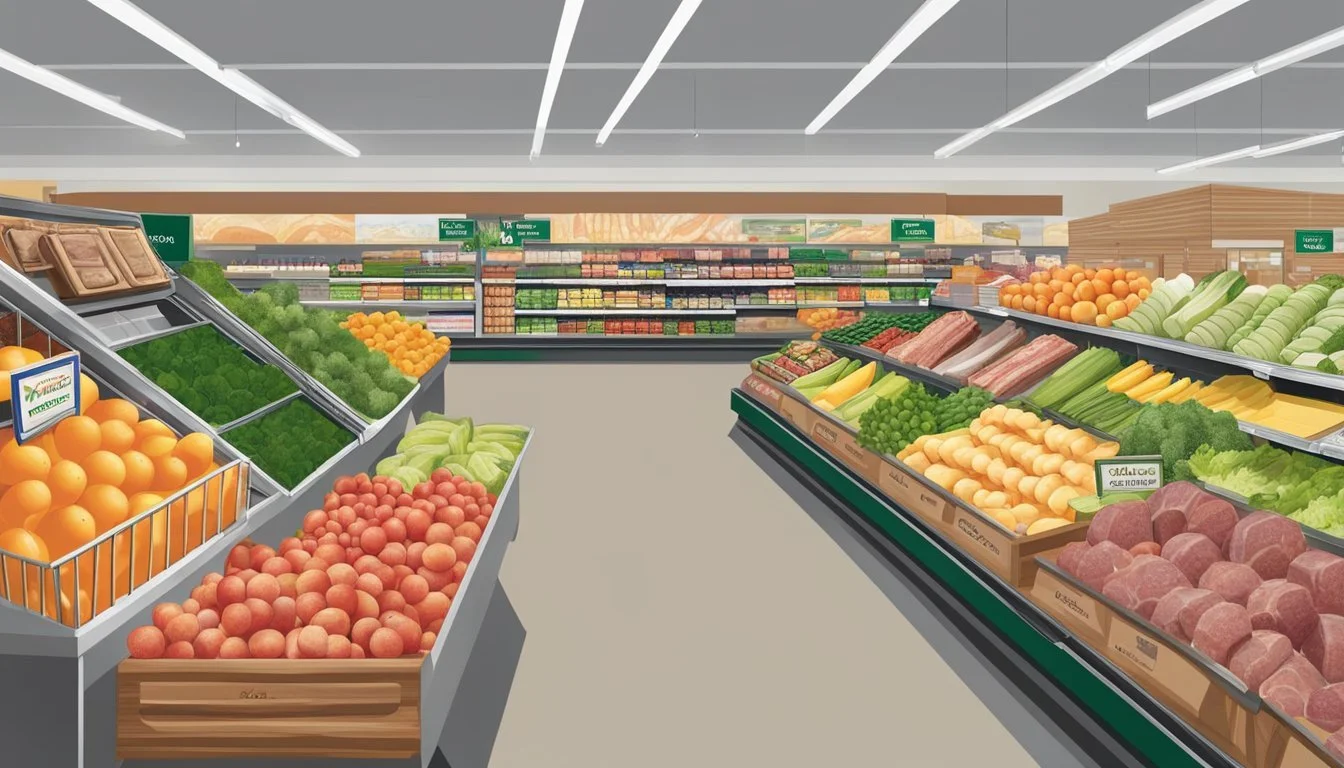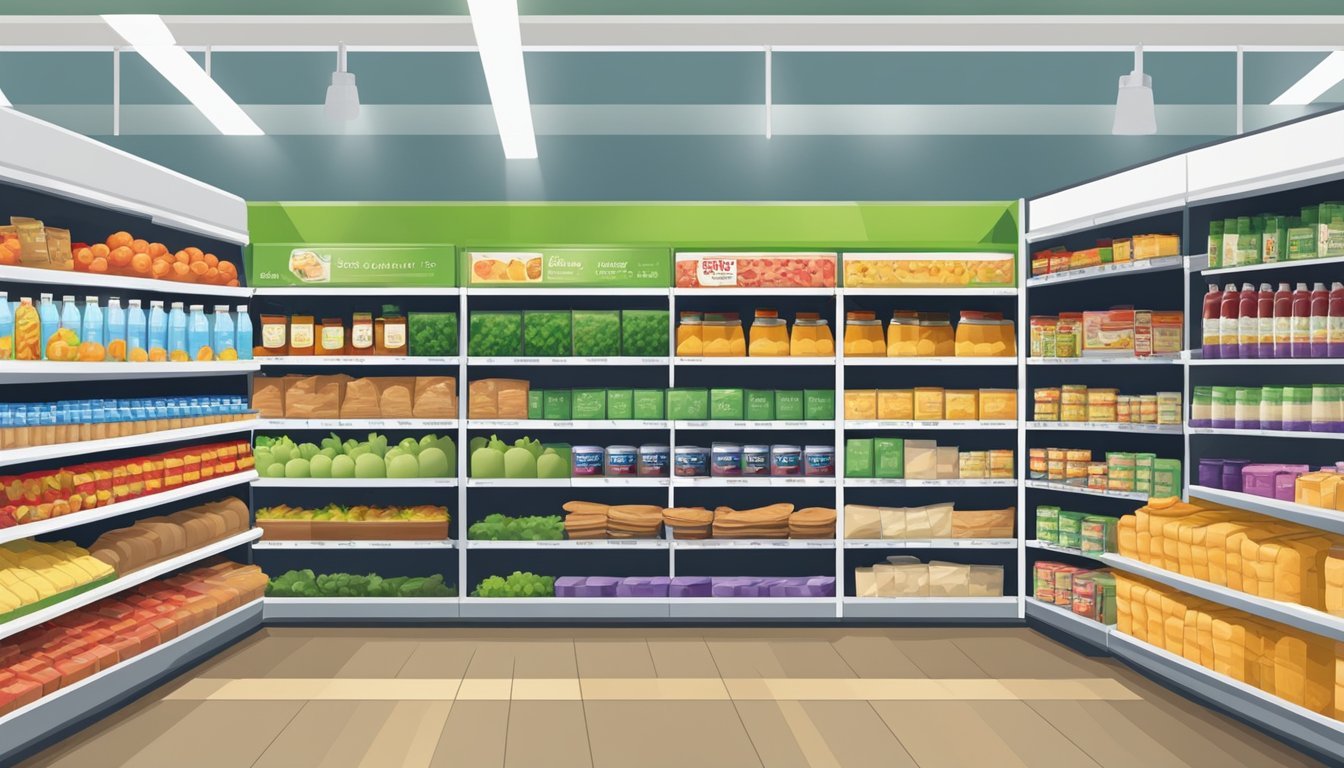Ingles Markets vs Sam's Club
A Comprehensive Comparison of Prices, Selection, and Quality
Grocery shopping can be a significant expense for many households, making the choice of supermarket crucial for budget-conscious consumers. Ingles Markets and Sam's Club are two popular options, each with its own strengths and weaknesses. Sam's Club generally offers lower prices on bulk items, while Ingles Markets provides a more traditional grocery shopping experience with a wider variety of products.
Both stores cater to different shopping needs. Ingles Markets operates as a regional supermarket chain, primarily in the southeastern United States. It offers a full range of groceries, including fresh produce, meats, and bakery items. Sam's Club, on the other hand, is a membership-based warehouse club known for bulk purchases and discounted prices on a more limited selection of items.
Consumers must weigh factors such as product selection, pricing, and convenience when deciding between these two grocery stores. Ingles Markets may be more suitable for those who prefer frequent shopping trips and a diverse range of products. Sam's Club could be the better choice for families or businesses looking to buy in bulk and save money on regularly used items.
Company Profiles
Ingles Markets and Sam's Club have distinct histories and business approaches in the grocery retail industry. Both companies have expanded their presence and adapted their models to serve customers in different ways.
History and Expansion
Ingles Markets began operations in 1963 in Asheville, North Carolina. The company has grown steadily, focusing on the Southeastern United States. Today, Ingles operates approximately 200 supermarkets across six states, primarily in the Appalachian region.
Sam's Club, founded in 1983, is a division of Walmart. It has expanded rapidly across the U.S. and internationally. The company now boasts over 600 locations nationwide, with a presence in most states.
Business Models
Ingles Markets operates as a traditional supermarket chain. It offers a wide range of groceries, fresh produce, and household items. The company emphasizes local products and operates its own dairy processing facility.
Sam's Club follows a warehouse club model. Members pay an annual fee for access to bulk items at discounted prices. The company sells groceries, electronics, furniture, and more.
Ingles targets individual shoppers and families in smaller communities. Sam's Club caters to both businesses and households seeking volume discounts.
While Ingles focuses on the East Coast, Sam's Club has a national presence. This gives Sam's Club broader reach but Ingles deeper regional ties.
Product Assortment and Quality
Ingles Markets and Sam's Club offer distinct product selections tailored to their respective business models. Both stores provide a range of grocery items but differ in variety, quality, and specialization.
Meat and Produce
Ingles Markets emphasizes fresh, locally-sourced produce and high-quality meats. Their meat department features USDA Choice and Prime cuts, with options for grass-fed beef. The produce section showcases a variety of seasonal fruits and vegetables, often sourced from regional farms.
Sam's Club, as a wholesale retailer, offers meat and produce in bulk quantities. Their meat selection includes USDA Choice beef, pork, and poultry. While the variety may be more limited than Ingles, Sam's Club compensates with competitive pricing on larger packages.
Both stores maintain strict quality control measures, but Ingles tends to have a slight edge in freshness due to its focus on local sourcing.
Organic and Health Options
Ingles Markets has expanded its organic and health-conscious offerings in recent years. They stock a wide range of organic produce, meats, and packaged goods. Their "Harvest Farms" private label includes many organic options.
Sam's Club has also increased its organic inventory, particularly in produce and dairy. They carry organic milk, eggs, and selected fruits and vegetables. However, their organic selection is generally smaller than Ingles Markets.
Both stores provide clear labeling for organic and health-conscious items, making it easier for customers to make informed choices.
Specialty Sections
Ingles Markets boasts several specialty sections that set it apart. Their bakery offers fresh-baked breads, cakes, and pastries made in-store daily. The deli section features prepared foods, including hot meals and custom sandwiches.
Sam's Club's specialty areas focus on bulk items. Their bakery provides larger-sized cakes and bread products. While they offer some prepared foods, the selection is typically more limited than Ingles Markets.
Ingles also maintains a wider variety of international foods and specialty diet items. Sam's Club, however, excels in bulk packaging of popular brands and staple items.
Pricing and Value for Money
Sam's Club and Ingles Markets offer distinct approaches to pricing and value. Their strategies impact membership structures, discount offerings, and private label products.
Membership and Pricing Structure
Sam's Club operates on a membership model, requiring an annual fee for access to its wholesale prices. Basic membership starts at $50 per year, while Plus membership costs $110 annually. Plus members enjoy additional perks like early shopping hours and extra savings.
Ingles Markets, in contrast, is open to all shoppers without a membership requirement. This allows customers to shop freely without upfront costs.
Sam's Club's bulk pricing often results in lower per-unit costs, especially on household staples and non-perishables. Ingles Markets offers competitive prices on a wider range of individual items, catering to shoppers who prefer smaller quantities.
Discounts and Savings
Sam's Club provides significant savings through bulk purchases and limited-time offers. Members can access exclusive deals through the Sam's Club app and website. The store also offers cash back on select purchases for Plus members.
Ingles Markets runs weekly sales and promotions advertised in circulars and their mobile app. Their Ingles Advantage Card program allows shoppers to earn points on purchases, redeemable for discounts on gas and groceries.
Both stores offer digital coupons, but Sam's Club's Instant Savings program often provides deeper discounts on featured items.
Private Label Brands
Sam's Club's Member's Mark brand spans a wide range of products, from groceries to household goods. These items typically offer quality comparable to national brands at lower prices.
Ingles Markets features its Laura Lynn private label across various categories. While the selection is smaller than Sam's Club's offering, Laura Lynn products provide budget-friendly alternatives to name brands.
Both chains prioritize quality in their store brands, but Sam's Club's larger scale often allows for more competitive pricing on private label items. Ingles Markets' Laura Lynn brand focuses on everyday essentials, giving shoppers reliable options at value prices.
Shopping Experience
Ingles Markets and Sam's Club offer distinct shopping experiences tailored to different customer needs. Their store layouts, product selections, and service approaches cater to varying preferences and shopping habits.
Store Layout and Design
Ingles Markets features a traditional supermarket layout with wide aisles and clearly marked departments. Produce sections are typically located near the entrance, followed by bakery and deli counters. The stores maintain a clean, well-lit atmosphere with easy-to-navigate shelving.
Sam's Club employs a warehouse-style design with high ceilings and bulk displays. Large pallets and stacks of products dominate the floor space. The layout encourages exploration, with seasonal items and rotating stock placed strategically throughout the store.
Both chains prioritize cleanliness, but Sam's Club's open floor plan can sometimes feel less intimate than Ingles' more compartmentalized design.
Customer Service
Ingles Markets prides itself on personalized service. Staff members are often available to assist with product locations and queries. The stores typically have multiple checkout lanes to reduce wait times during peak hours.
Sam's Club operates with a more self-service model. Fewer staff members are present on the floor, but they are generally knowledgeable about bulk purchases and membership benefits. Self-checkout kiosks are common, offering a quick option for customers with fewer items.
Consumer Reports surveys indicate that Ingles scores higher in customer satisfaction for service, while Sam's Club receives praise for its efficient checkout process and return policy.
Consumer Perceptions and Loyalty
Brand reputation and loyalty programs significantly influence consumer choices between Ingles Markets and Sam's Club. Both stores strive to cultivate positive perceptions and foster customer loyalty through different strategies.
Brand Reputation
Ingles Markets, a regional supermarket chain, has built a reputation for community involvement and locally-sourced products. Consumers often perceive Ingles as a neighborhood store with a personal touch. Many shoppers appreciate the company's efforts to support local farmers and suppliers.
Sam's Club, on the other hand, is known for its bulk purchasing options and competitive pricing. The warehouse club's brand is associated with value and savings. Research indicates that Sam's Club consistently receives high marks for affordability and product variety.
A recent survey found that 71% of consumers view Sam's Club favorably, particularly for its wide selection of items. Ingles Markets scored well in customer service, with 58% of respondents praising their friendly staff and personalized shopping experience.
Customer Loyalty Programs
Sam's Club offers a tiered membership program. The basic membership costs $45 annually, while the Plus membership is $100 per year. Plus members enjoy additional benefits like free shipping and early shopping hours.
Ingles Markets provides the Ingles Advantage Card. This free loyalty program allows customers to earn points on purchases and access exclusive discounts. The card also offers fuel savings at Ingles Gas Express locations.
Both programs aim to incentivize repeat visits and increase customer spend. Sam's Club's approach focuses on membership perks, similar to Amazon Prime. Ingles Markets emphasizes everyday savings and rewards accumulation.
A 2023 study revealed that 63% of Sam's Club members renew their memberships annually. Ingles Markets' loyalty program boasts a 72% active user rate among its regular customers.
Accessibility and Location Convenience
Store presence and availability play a crucial role in determining the convenience of shopping at Ingles Markets versus Sam's Club. Each retailer has distinct location strategies that impact their accessibility to customers.
Store Presence and Availability
Ingles Markets operates primarily on the East Coast of the U.S., with a strong presence in southeastern states. The company has over 200 supermarkets spread across six states, including North Carolina, South Carolina, Georgia, Tennessee, Alabama, and Virginia.
Sam's Club, on the other hand, has a broader national presence with approximately 600 locations across 44 states and Puerto Rico. This wider distribution gives Sam's Club an edge in terms of availability for many U.S. shoppers.
Ingles Markets tends to focus on smaller towns and rural areas, making it more accessible to customers in these regions. Sam's Club stores are typically found in suburban areas near major population centers.
While Sam's Club has more total locations, Ingles Markets may offer greater convenience for residents in its core operating area. The choice between the two often depends on a shopper's specific location and proximity to each store.
Final Verdict
Ingles Markets and Sam's Club cater to different consumer needs. Ingles Markets offers a traditional supermarket experience with a focus on fresh produce and local products. Sam's Club provides bulk purchasing options and a membership model.
Consumers seeking everyday groceries and a wider variety of fresh items may prefer Ingles Markets. The store's emphasis on local produce can appeal to those prioritizing community support and freshness.
Sam's Club excels in bulk purchases and discounted prices on many items. It's ideal for large families, small businesses, or those who prefer to stock up less frequently. The membership fee can be offset by savings for regular shoppers.
Both stores have strengths in different departments. Ingles Markets typically offers a more extensive selection of fresh produce and specialty items. Sam's Club often provides better deals on packaged goods, electronics, and household items.
The choice between these grocery stores ultimately depends on individual shopping habits, budget considerations, and specific product needs. Savvy consumers may benefit from utilizing both stores strategically to maximize savings and selection.









